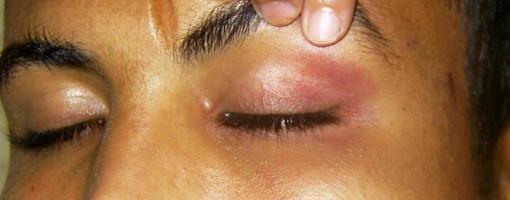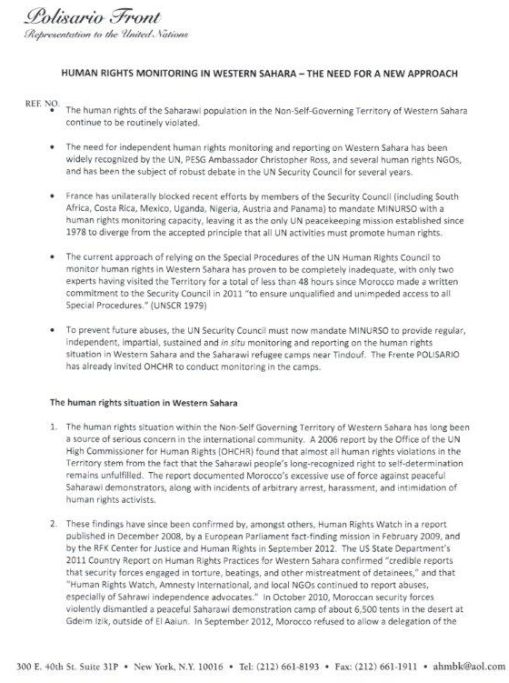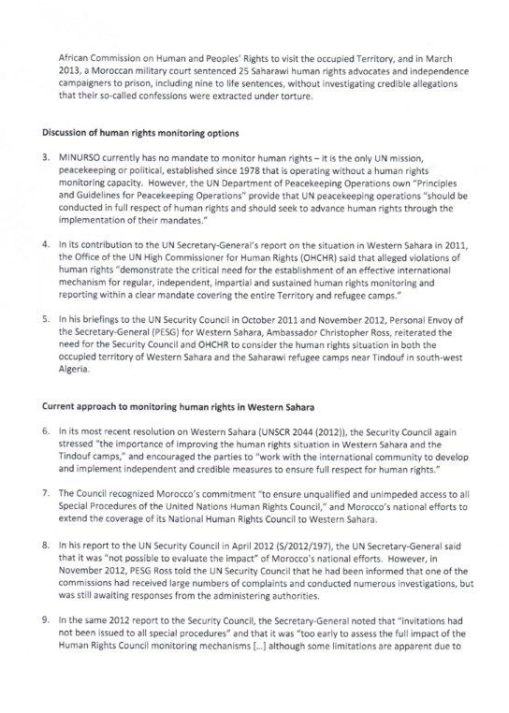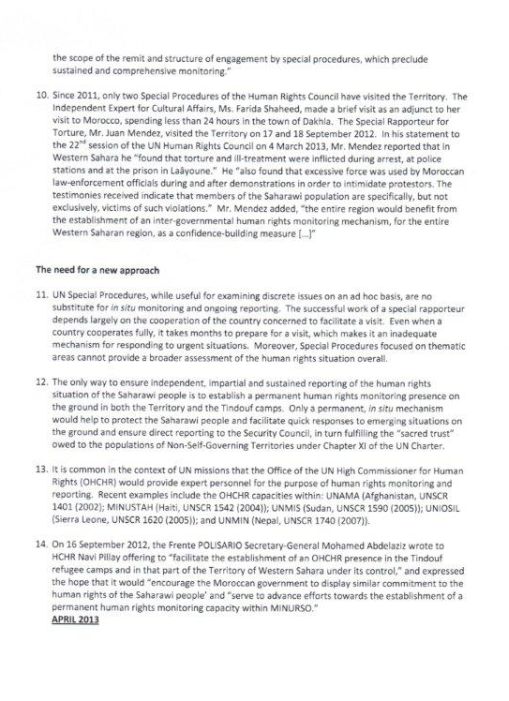
The Western Sahara liberation movement, Frente Polisario, publishes its position on human rights monitoring.
The statement below was recently issued by Polisario, Western Sahara's liberation movement.
Human rights monitoring in Western Sahara - the need for a new approach
- The human rights of the Saharawi population in the Non-Self-Governing Territory of Western Sahara continue to be routinely violated.
- The need for independent human rights monitoring and reporting on Western Sahara has been widely recognized by the UN, PESG Ambassador Christopher Ross, and several human rights NGOs, and has been the subject of robust debate in the UN Security Council for several years.
- France has unilaterally blocked recent efforts by members of the Security Council (including South Africa, Costa Rica, Mexico, Uganda, Nigeria, Austria and Panama) to mandate MINURSO with a human rights monitoring capacity, leaving it as the only UN peacekeeping mission established since 1978 to diverge from the accepted principle that all UN activities must promote human rights.
- The current approach of relying on the Special Procedures of the UN Human Rights Council to monitor human rights in Western Sahara has proven to be completely inadequate, with only two experts having visited the Territory for a total of less than 48 hours since Morocco made a written commitment to the Security Council in 2011 "to ensure unqualified and unimpeded access to all Special Procedures." (UNSCR 1979)
- To prevent future abuses, the UN Security Council must now mandate MINURSO to provide regular, independent, impartial, sustained and in situ monitoring and reporting on the human rights situation in Western Sahara and the Saharawi refugee camps near Tindouf. The Frente POLISARIO has already invited OHCHR to conduct monitoring in the camps.
The human rights situation in Western Sahara
1. The human rights situation within the Non-Self Governing Territory of Western Sahara has long been a source of serious concern in the international community. A 2006 report by the Office of the UN High Commissioner for Human Rights (OHCHR) found that almost all human rights violations in the Territory stem from the fact that the Saharawi peoples long-recognized right to self‐determination remains unfulfilled. The report documented Moroccos excessive use of force against peaceful Saharawi demonstrators, along with incidents of arbitrary arrest, harassment, and intimidation of human rights activists.
2. These findings have since been confirmed by, amongst others, Human Rights Watch in a report published in December 2008, by a European Parliament fact-finding mission in February 2009, and by the RFK Center for Justice and Human Rights in September 2012. The US State Department's 2011 Country Report on Human Rights Practices for Western Sahara confirmed "credible reports that security forces engaged in torture, beatings, and other mistreatment of detainees," and that "Human Rights Watch, Amnesty International, and local NGOs continued to report abuses, especially of Sahrawi independence advocates." In October 2010, Moroccan security forces violently dismantled a peaceful Saharawi demonstration camp of about 6,500 tents in the desert at Gdeim Izik, outside of El Aaiun. In September 2012, Morocco refused to allow a delegation of the African Commission on Human and Peoples Rights to visit the occupied Territory, and in March 2013, a Moroccan military court sentenced 25 Saharawi human rights advocates and independence campaigners to prison, including nine to life sentences, without investigating credible allegations that their so-called confessions were extracted under torture.
Discussion of human rights monitoring options
3. MINURSO currently has no mandate to monitor human rights - it is the only UN mission, peacekeeping or political, established since 1978 that is operating without a human rights monitoring capacity. However, the UN Department of Peacekeeping Operations own "Principles and Guidelines for Peacekeeping Operations" provide that UN peacekeeping operations "should be conducted in full respect of human rights and should seek to advance human rights through the implementation of their mandates."
4. In its contribution to the UN Secretary-General's report on the situation in Western Sahara in 2011, the Office of the UN High Commissioner for Human Rights (OHCHR) said that alleged violations of human rights "demonstrate the critical need for the establishment of an effective international mechanism for regular, independent, impartial and sustained human rights monitoring and reporting within a clear mandate covering the entire Territory and refugee camps."
5. In his briefings to the UN Security Council in October 2011 and November 2012, Personal Envoy of the Secretary-General (PESG) for Western Sahara, Ambassador Christopher Ross, reiterated the need for the Security Council and OHCHR to consider the human rights situation in both the occupied territory of Western Sahara and the Saharawi refugee camps near Tindouf in south-west Algeria.
Current approach to monitoring human rights in Western Sahara
6. In its most recent resolution on Western Sahara (UNSCR 2044 (2012)), the Security Council again stressed "the importance of improving the human rights situation in Western Sahara and the Tindouf camps," and encouraged the parties to "work with the international community to develop and implement independent and credible measures to ensure full respect for human rights."
7. The Council recognized Moroccos commitment to ensure unqualified and unimpeded access to all Special Procedures of the United Nations Human Rights Council, and Moroccos national efforts to extend the coverage of its National Human Rights Council to Western Sahara.
8. In his report to the UN Security Council in April 2012 (S/2012/197), the UN Secretary-General said that it was "not possible to evaluate the impact" of Morocco's national efforts. However, in November 2012, PESG Ross told the UN Security Council that he had been informed that one of the commissions had received large numbers of complaints and conducted numerous investigations, but was still awaiting responses from the administering authorities.
9. In the same 2012 report to the Security Council, the Secretary-General noted that “invitations had not been issued to all special procedures" and that it was "too early to assess the full impact of the Human Rights Council monitoring mechanisms […] although some limitations are apparent due to the scope of the remit and structure of engagement by special procedures, which preclude sustained and comprehensive monitoring.”
10. Since 2011, only two Special Procedures of the Human Rights Council have visited the Territory. The Independent Expert for Cultural Affairs, Ms. Farida Shaheed, made a brief visit as an adjunct to her visit to Morocco, spending less than 24 hours in the town of Dakhla. The Special Rapporteur for Torture, Mr. Juan Mendez, visited the Territory on 17 and 18 September 2012. In his statement to the 22nd session of the UN Human Rights Council on 4 March 2013, Mr. Mendez reported that in Western Sahara he "found that torture and ill-treatment were inflicted during arrest, at police stations and at the prison in Laâyoune." He "also found that excessive force was used by Moroccan law-enforcement officials during and after demonstrations in order to intimidate protestors. The testimonies received indicate that members of the Saharawi population are specifically, but not exclusively, victims of such violations." Mr. Mendez added, the entire region would benefit from the establishment of an inter-governmental human rights monitoring mechanism, for the entire Western Saharan region, as a confidence-building measure […]"
The need for a new approach
11. UN Special Procedures, while useful for examining discrete issues on an ad hoc basis, are no substitute for in situ monitoring and ongoing reporting. The successful work of a special rapporteur depends largely on the cooperation of the country concerned to facilitate a visit. Even when a country cooperates fully, it takes months to prepare for a visit, which makes it an inadequate mechanism for responding to urgent situations. Moreover, Special Procedures focused on thematic areas cannot provide a broader assessment of the human rights situation overall.
12. The only way to ensure independent, impartial and sustained reporting of the human rights situation of the Saharawi people is to establish a permanent human rights monitoring presence on the ground in both the Territory and the Tindouf camps. Only a permanent, in situ mechanism would help to protect the Saharawi people and facilitate quick responses to emerging situations on the ground and ensure direct reporting to the Security Council, in turn fulfilling the “sacred trust” owed to the populations of Non‐Self‐Governing Territories under Chapter XI of the UN Charter.
13. It is common in the context of UN missions that the Office of the UN High Commissioner for Human Rights (OHCHR) would provide expert personnel for the purpose of human rights monitoring and reporting. Recent examples include the OHCHR capacities within: UNAMA (Afghanistan, UNSCR 1401 (2002); MINUSTAH (Haiti, UNSCR 1542 (2004)); UNMIS (Sudan, UNSCR 1590 (2005)); UNIOSIL (Sierra Leone, UNSCR 1620 (2005)); and UNMIN (Nepal, UNSCR 1740 (2007)).
14. On 16 September 2012, the Frente POLISARIO Secretary-General Mohamed Abdelaziz wrote to HCHR Navi Pillay offering to “facilitate the establishment of an OHCHR presence in the Tindouf refugee camps and in that part of the Territory of Western Sahara under its control,” and expressed the hope that it would “encourage the Moroccan government to display similar commitment to the human rights of the Saharawi people” and “serve to advance efforts towards the establishment of a permanent human rights monitoring capacity within MINURSO.”
APRIL 2013



Order our Western Sahara poster!
“Try to Visit Western Sahara”…
The Security Council fails Western Sahara and international law
On 31 October 2025, a new resolution was adopted in the UN Security Council calling on the Saharawis to negotiate a solution that would entail their incorporation into the occupying power, Morocco.
Saharawis Demonstrate Against Trump Proposal
The United States has proposed in a meeting of the UN Security Council on Thursday that the occupied Western Sahara be incorporated into Morocco.
Skretting Turkey misled about sustainability
Dutch-Norwegian fish feed giant admits using conflict fishmeal from occupied Western Sahara. Last month, it removed a fake sustainability claim from its website.



